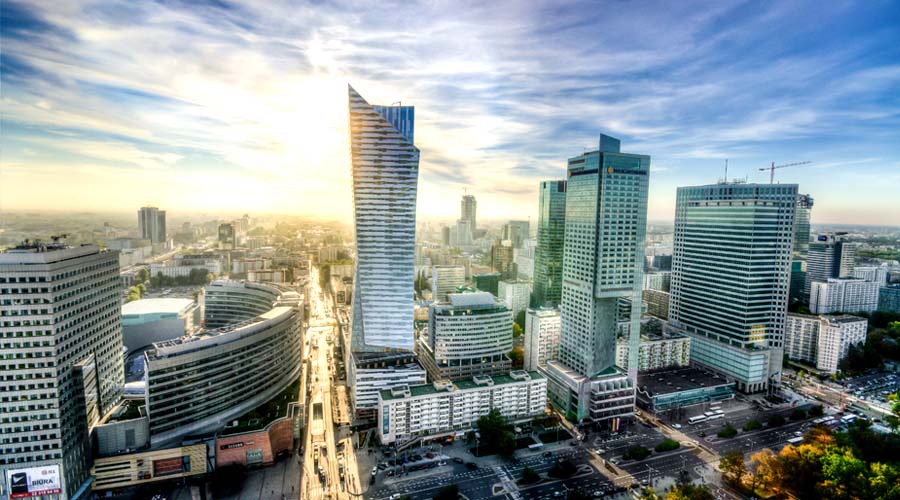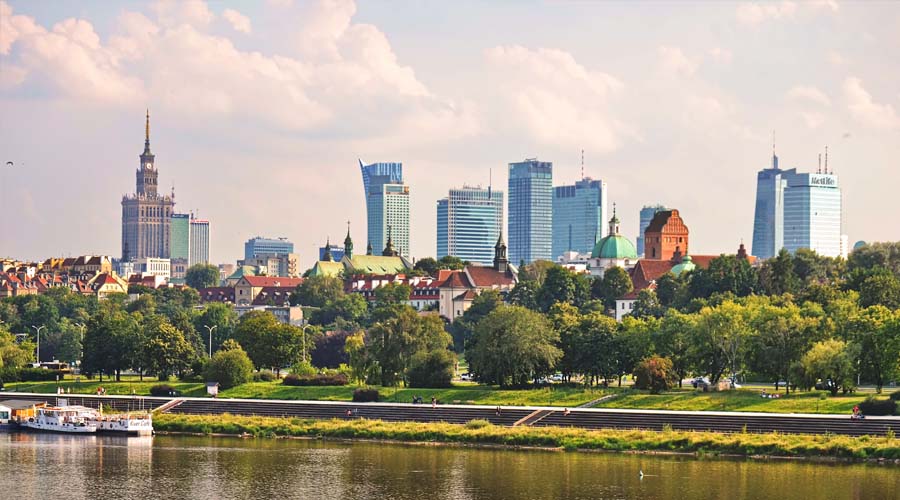Poland is a fascinating country that serves as the geographical and cultural crossroads of Eastern and Western Europe. Located at the center of the Northern European plain, Poland has been a nation of survivors since the foundation of the first Polish state more than 1000 years ago. Through its turbulent history its people have managed to maintain their identity, and today, the country enjoys a crucial position as the largest of the former Eastern European states and one of the most populous members of the European Union.
Poland

- Poland is located in the very Centre of Europe. It’s the seventh biggest country on the continent. Polish population is nearly 38 million people. The capital city is Warsaw (around 2 million inhabitants).
- Poland borders 7 countries: Germany on the west, Czech Republic and Slovakia on the south, Ukraine, Belarus and Lithuania on the east, and Russia on the north.
- Poland is placed in a moderate zone with mixed continental and oceanic climate influences. The average annually temperature is about 6-8 degrees Celsius while the rainfall is estimated at 700 mm.
- Cost of living is low in Poland as compared other European countries. An amount of 200-250 USD is enough to cover accommodation charges, food and travel expenses.
- Tuition fee in Polish universities is also low as compared to that of other places in the EU. Yearly tuition fees are around 1000 USD- 4000 USD. Course such as medicine and engineering fall under the more expensive category where yearly tuition fees are around 4000 USD. Hotel management course fees might go above 5000 USD which is however balanced out by the salary which the students earn during their internships.
- Poland offers easier access to other European countries such as Germany. Germany offers handsome job opportunities in various sectors and thus many pass outs from Polish universities apply to German companies for work. The culture and environment in the two countries is similar and thus students will not find it difficult to adjust. Poland acts as the entry point of Germany and other European countries since it is also easy to get visa for these places from Poland.
- Opportunities for entertainment and relaxation are ample in Poland. There are great cinema theatres, museums, gyms and swimming pools, clubs and pubs. The entry fee to these places is not always high either. There are discounts for students in most places too.
- Polish universities have tie ups with many noted universities and organisations in different parts of the world thus allowing students the opportunity to explore internship facilities at such places. Polish universities have their partners in countries like the United Kingdom, the United States, Australia, Switzerland and Greece. These opportunities are great for the development of students and also allow them to earn some cash to cover their cost of living.
Education Systems
- Bachelor (BA, Licencjat)
Obtained following the completion of 3-3,5 year-long vocational/technical college studies - Bachelor (BSc, Inżynier)
Obtained following the completion of 3,5-4 year-long college studies in technical sciences, agriculture and economy. - Master (MA, MSc, Magister)
Equivalent degrees: Master of Art, Master Engineer, Master Engineer Architect, qualified physician, dental surgeon or veterinarian. Granted following the completion of 5-6 year long uniform university studies. The MSc may also be obtained following the completion of 2-2,5 years-long supplementary master’s degree studies which may be taken by persons with a college diploma. - Doktor (PhD, Doktor)
A degree awarded to those who pass doctoral exam and successfully defend dissertation. To qualify for the academic degree of doctor one must hold a master or equivalent degree
Visa
Temporary Residence Card will allow you to cross the Polish border as many times as you wish. The first residence permit is issued for the period of 15 months. It can be renewed for periods of up to 3 years but for no longer than the remainder of your studies.Note: In order to prolong your stay, you need to apply for a Temporary Stay Card 45 days before your visa expires.
Intakes
Study program commencing in October for fall semester and February for spring semester
Student living costs in Poland
Poland is an accessible European country with a pretty stable economy and living costs of 300 – 650 EUR/month. You can adjust your budget depending on the city or area you wish to study in. Larger cities such as Krakow or Warsaw require 450 – 550 EUR/month.
If you will find a degree course in a smaller town as Radom, Sochaczew or Stalowa Wola, you will need a total of 300 – 350 EUR/month. The most expensive city in Poland is Pulkowice, where you will spend around 600 – 650 EUR/month.
In the cheapest places you can eat a one-course meal for EUR 2–4, in restaurants of a higher standard you will pay EUR 12 or more for a three-course meal.
Cinema tickets will set you back by EUR 3–7. Theatre, opera or concert tickets are more expensive: about EUR 7–23. Night life is the most expensive in the capital and in large cities. the entry into a club costs 2.50– 30; you will pay PLN 7–13 for 0.5l of beer and PLN 15–30 for a cocktail.
Some examples of average prices per month:
• Rent in a shared flat (or dormitory) – EUR 80-150
• Transportation (in big cities) – EUR 15-20
• Telephone/mobile, Internet, TV – EUR 12- 75
Tuition fees in Poland
While Polish citizens don’t pay for tuition fees in public universities, international students are charged with fees established by the universities. These cost the least:
• 2,000-4000 EUR for Bachelor, Master degree courses and professional studies
• 3,000-4000 EUR for Ph.D., specialised and vocational courses
Process and Procedures for study in Poland
- Counseling
- University /Course selection
- Document Submission
- Application process
- Conditional/ Unconditional Offer letter
- Pay the tuition deposit
- University tuition Contract
- Visa Counseling
- Visa Interview Appointment
- Visa document submission + personal interview
- Visa Approval
- Balance of 1st year fees.
- Pre Departure Briefing
- Foreign Currency Exchange /Ticketing
- Post landing Assistance: Airport Pick up and Accommodation arrangements.


